

Smile! Satellites can see your illegal fishing from space. If a fish falls in the forest and no one is there to hear it … wait, is that not how it goes?

Butterfly wings inspire new high-tech surfaces. A South American butterfly flapped its wings, and caused a flurry of nanotechnology research to happen in Ohio.
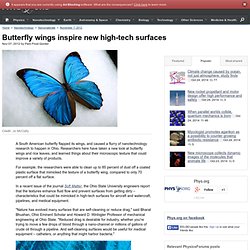
Researchers here have taken a new look at butterfly wings and rice leaves, and learned things about their microscopic texture that could improve a variety of products. For example, the researchers were able to clean up to 85 percent of dust off a coated plastic surface that mimicked the texture of a butterfly wing, compared to only 70 percent off a flat surface. In a recent issue of the journal Soft Matter, the Ohio State University engineers report that the textures enhance fluid flow and prevent surfaces from getting dirty – characteristics that could be mimicked in high-tech surfaces for aircraft and watercraft, pipelines, and medical equipment. "Nature has evolved many surfaces that are self-cleaning or reduce drag," said Bharat Bhushan, Ohio Eminent Scholar and Howard D. Earth - The monkey that became a midwife.
Giving birth can be a wonderful, literally life-affirming event.
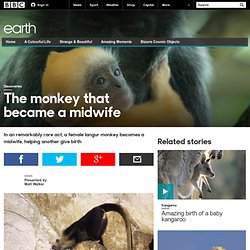
But one extraordinary monkey has taken it to a new level; by acting as a midwife to another monkey in the act of having a baby. The incident is so rare it has never been recorded before in detail, or filmed or photographed. The other female just actively approached her and took over, and pulled the infant completely out of the birth canal. China closes poultry sale in third city after bird flu outbreak. A janitor sprays disinfectant over empty chicken cages at a market in New Taipei City, Taiwan, on Monday, April 29.
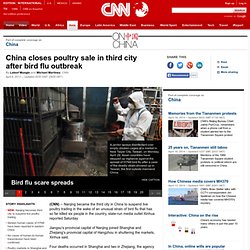
Asian countries have stepped up vigilance against the spread of H7N9 bird flu after a case of the deadly strain showed up in Taiwan, the first outside mainland China. A New Taipei City Department of Environmental Protection truck sprays a virus disinfectant in a park on April 29. Doctors hold a consultation on the treatment for a patient surnamed Luo, the province's first human case of H7N9 avian influenza, at the No. 2 Hospital in Longyan City, in southeast China's Fujian Province, on April 27.
Luo, 65, a local resident, showed symptoms of repeated coughing, low fever and a tight chest on April 18. Luo tested positive for the H7N9 virus on Friday by the Chinese Center for Disease Control and Prevention. Diversification of British farming – it’s more than just ditching sheep for alpacas. (c) Pete Cooper When people think of “diversification” of farming, it tends to be along the lines of ditching sheep for alpacas, or setting up farm shops and public orchards.
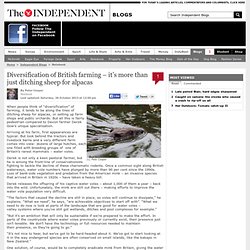
But all this is fairly pedestrian compared to Devon farmer Derek Gow’s unique specialisation. Arriving at his farm, first appearances are typical. But look behind the tractors and livestock barns and a very different farm comes into view: dozens of large hutches, each one filled with breeding groups of one of Britain’s rarest mammals – water voles. Derek is not only a keen pastoral farmer, but he is among the front-line of conservationists fighting to tackle the decline of these charismatic rodents. Derek releases the offspring of his captive water voles – about 1,000 of them a year – back into the wild. “The factors that caused the decline are still in place, so voles will continue to dissipate,” he explains. “But it’s an ambition that will only be sustainable if we’re prepared to make the effort. (c) Peter Cooper. The colorful lionfish and 3 other invasive species we should be eating.
Dry Land, Dry Sentiment: Remembering Traditional Patterns in Times of Drought. 0inShare Share Pastoralists in Kenya are suffering huge losses as livestock herds are decimated by water shortages.
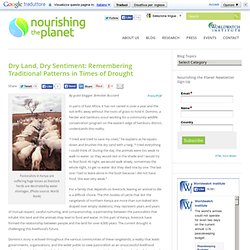
(Photo source: World Bank) By guest blogger: Brendan Buzzard In parts of East Africa, it has not rained in over a year and the soil drifts away without the roots of grass to hold it. “I tried and tried to save my cows,” he explains as he squats down and brushes the dry sand with a twig.
Herpetology. Bees - Colony Collapse Disorder. Apiary. Marine Stewardship Council - home — MSC. All Regions Guide - Online Seafood Watch Guide for Sustainable Seafood Choices. National Wildlife Health Center - Recent Mortality Events. USGS and a network of partners across the country work on documenting wildlife mortality events in order to provide timely and accurate information on locations, species and causes of death.
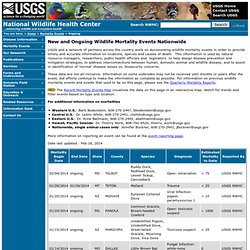
This information is used by natural resource managers, researchers, public health officials and legislators to help design disease prevention and mitigation strategies, to address interconnections between human, domestic animal and wildlife disease, and to assist in identification of 'normal' disease issues vs. biosecurity concerns. These data are not all-inclusive. Information on some outbreaks may not be received until months or years after the event, but efforts continue to make the information as complete as possible. For information on previous wildlife mortality events and events that used to be on this page, please see the Quarterly Mortality Reports. The Recent Mortality Events Map visualizes the data on this page in an interactive map.